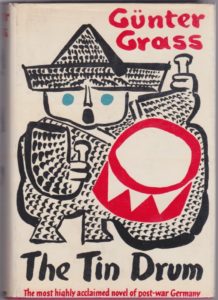“Even bad books are books and therefore sacred,” said Günter Grass, a German novelist and political activist who won the Nobel Prize in 1999 and is best known for his sweeping novel The Tin Drum. The novel tells the story of World War II from the perspective of Oscar Matzerath, a dwarf who willfully stopped growing at age three and is recounting his youth from an asylum many years later.
Oscar’s story is a picaresque romp through childhood, told by a man whose sanity is always in question. He tells us of his two “putative” fathers—his mother’s husband and his mother’s lover—and is able to “singshatter” windows to pieces by screaming. His constant companion throughout the story is a tin drum (a series of them, actually) that he beats to pieces while venting his nearly constant frustration with the world and the war.
When the novel was published in 1959, it shocked the German public. There was outrage over what was considered a blasphemous and pornographic tale. And the subtler political implications of the novel did not go unnoticed—Grass wrote The Tin Drum as an allegory of post-war Germany’s refusal to face the realities of what happened in World War II, accept responsibility, and move on.
But the novel is so much more than political allegory, and so much more than just a German book. Its enduring appeal in English has been so great that we have Grass to thank for the idiom “to beat a tin drum,” which means creating a disturbance to bring attention to a cause. And The Tin Drum brings to our attention a very good book in itself.
Günter Grass must-read:
The Tin Drum
(UVic library code: PT2613 R338B513)


